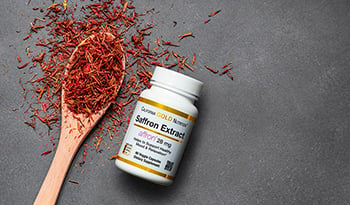Resveratrol: A Powerful Antioxidant That Might Benefit Mental Health

What is Resveratrol?
Resveratrol (RSV) is a naturally occurring polyphenol that functions as a phytoestrogen. It is found in berries, nuts, grapes, and other plant sources that are widely used in Asian medicine. Accumulating research findings from animal and human trials support that resveratrol may have beneficial effects on a variety of medical and psychiatric disorders mediated by anti-inflammatory and antioxidant effects however findings of most human clinical trials are limited by study design flaws and small sample size. Because resveratrol may result in similar changes in gene expression induced by caloric restriction it is being investigated for its potential effects on prolonging the lifespan, however findings of nonhuman primate studies are inconsistent.
How Does Resveratrol Work?
Beneficial effects of resveratrol on mood, anxiety and cognitive function may be mediated by a variety of mechanisms. Accumulating research findings support that resveratrol has protective effects against neurodegenerative diseases and may slow the rate of progression of cognitive symptoms. Findings of animal studies suggest that resveratrol may have neuroprotective effects on Parkinson’s disease, Huntington’s disease, multiple sclerosis, Alzheimer’s disease and other neurodegenerative diseases. Findings of in vivo studies suggest that resveratrol-induced antidepressant- and anxiolytic-like effects are mediated by inhibition of phosphodiesterase 4. A recently published study reported that resveratrol prevented and reversed oxidative damage to proteins and lipids in many brain regions in an animal model of mania. The beneficial effects of resveratrol on Alzheimer’s disease may be mediated by its role in reducing risk of metabolic syndrome resulting in reduced inflammation in the body and brain, cerebral arterial vasodilation, and direct neuroprotective effects on brain regions in the medial cortex and hypothalamus. Finally, resveratrol induces epigenetic alterations in the DNA possibly reducing the risk of developing different kinds of chronic disease.
How can Resveratrol Benefit Cognitive Function?
Accumulating findings of animal and a few human clinical trials have led to increasing interest in resveratrol for enhancing cognitive function in healthy adults and as a potential treatment of Alzheimer’s disease and other degenerative neurologic disorders.
To date findings of studies on cognitive effects of resveratrol and other phytoestrogens in healthy populations are inconsistent possibly reflecting differences in dosage, study duration and tests used to assess cognitive function. Healthy men who received short-term treatment with resveratrol (250 to 500mg) experienced dose-dependent increases in cerebral blood flow but did not experience improvements in cognitive function. In a 4-week study, healthy adults treated with resveratrol 500mg reported a significant reduction in fatigue but no changes in cognitive performance. In a 26-week study, healthy overweight older adults treated with a combined regimen of resveratrol and quercetin experienced improvements in memory and were found to have enhanced functional connectivity in the hippocampus and higher cerebral glucose metabolism. Resveratrol may have cognitive-enhancing effects in healthy older adults. A systematic review of 23 randomized controlled trials found small to medium effect size improvements in cognitive function in older males and post-menopausal women who took resveratrol 150 to 200mg/day for at least 14 weeks. Improved cognitive function was correlated with improved cerebral blood flow.
Polyphenols including resveratrol and others are the subject of increasing research interest because of their potential role in preventing Alzheimer’s disease, however, this work is still at a very early stage and few human clinical trials have been done. In a placebo-controlled double-blind multicenter 52-week Phase 2 study examining resveratrol for its safety and tolerability individuals (N=119) diagnosed with mild to moderate Alzheimer’s disease (AD) were randomized to placebo vs resveratrol. Individuals treated with resveratrol were started at 500mg/day and increased by 500mg increments every 13 weeks to a maximum of 2000mg/day. Data collected during the study included biomarkers of AD, volumetric MRI, and clinical outcomes. Individuals in the resveratrol group were found to have slower declines in CSF levels of biomarkers that may reflect the reduced accumulation of amyloid-beta in the brain. Significantly, the resveratrol group also had decreased levels of MMP-9, a biomarker associated with increased risk of neurodegenerative processes associated with AD. This finding suggests that resveratrol plays a direct neuroprotective role by reducing the permeability of the blood-brain barrier to pro-inflammatory molecules. The most commonly reported adverse effects were nausea, diarrhea, and weight loss. In a retrospective study analysis of a subset of individuals with AD who had received resveratrol in the (above) Phase II study showed marked improvement in CSF and plasma biomarkers compared to the placebo group, and improved scores on measures of activities of daily living (ADL). Further studies are needed to interpret the significance of changes in biomarkers of AD associated with resveratrol.
Resveratrol and Depression
Research on resveratrol as a potential treatment of depressed mood is at a very early stage. Findings of in vivo and animal studies suggest that resveratrol has neuroprotective effects against pathological changes in the brain mediated by oxidative stress and inflammation that may manifest as a depressed mood. These findings have led to recently increased interest in resveratrol as a potential antidepressant.
Is Resveratrol Safe?
Resveratrol is generally well tolerated at commonly recommended doses. The most common side effects of resveratrol are diarrhea, nausea, and weight loss. More severe side effects have been reported at high doses up to 2000mg twice daily. Adverse drug interactions have not been reported however high doses of resveratrol are known to inhibit cytochrome P450 enzymes resulting in potential interactions with many drugs.
How to Get the Most Out of Supplementing With Resveratrol
An important ongoing area of research involves developing products with greater bioavailability in order to enhance the potential beneficial effects of resveratrol on the body and brain. When taken alone the potential cognitive benefits of resveratrol may be limited by its low bioavailability due to its low stability, rapid oxidation on exposure to heat and light, low water solubility and also its high rate of uptake in the liver. Findings of in vivo and animal studies suggest that both bioavailability and efficacy of resveratrol for different clinical indications may be enhanced when taken in combination with other natural products. A recent study found that combining resveratrol with piperine significantly increased bioavailability in the brain and resulted in increased cerebral blood flow but did not improve cognitive function or mood. Large animal and human trials are needed to elucidate how genetic differences, age, gender, diet and variability in the microbiome influence the bioavailability of resveratrol. Inter-individual differences in bioavailability imply that the minimal effective dose of resveratrol—taken alone or in combination with other natural products or as an adjunct to drugs—needs to be evaluated on a case by case basis.
Efforts are ongoing to improve the bioavailability of resveratrol through novel delivery systems and semi-synthetic derivatives including nanoencapsulation in lipid nanocarriers or liposomes, nanoemulsions, and other approaches. Promising early findings have been reported however more in vivo studies are needed to identify approaches that are both appropriate and safe for clinical use.
Resveratrol is a Promising Compound
Resveratrol holds promise as an important future non-pharmacologic treatment of many medical and neuropsychiatric disorders. Research on resveratrol as a potential treatment of cognitive decline in Alzheimer’s disease, other neurodegenerative diseases, and depressed mood is still at an early stage. To date, most research evidence comes from animal studies. Only a few human clinical trials have been done, mostly on healthy patients. Large, long-term placebo-controlled human clinical trials are needed to evaluate the safety profile of resveratrol, further characterize potential interactions with other natural products or drugs, identify preparations that increase bioavailability, and determine optimal safe dosages for medical and neuropsychiatric disorders.
References:
- Adeghate E, Donath T, Adem A. (2013) Alzheimer disease and diabetes mellitus: do they have anything in common? Curr Alzheimer Res.; 10:609–617.
- Amri A, Chaumeil JC, Sfar S, Charrueau C. (2012) Administration of resveratrol: What formulation solutions to bioavailability limitations? J Control Release.; 158:182–193.
- Baur JA, Sinclair DA. (2006) Therapeutic potential of resveratrol: the in vivo evidence. Nat Rev Drug Discov.; 5:493–506.
- Blanchet J, Longpre F, Bureau G, Morissette M, DiPaolo T, et al (2008) Resveratrol, a red wine polyphenol, protects dopaminergic neurons in MPTP-treated mice. Prog Neuropsychopharmacol Biol Psychiatry.; 32:1243–1250.
- Chimento, A., De Amicis, F., Sirianni, R., Stefania, M. et al (2019) Progress to Improve Oral Bioavailability and Beneficial Effects of Resveratrol J Mol Sci.; 20(6): 1381.
- Colman RJ, Beasley TM, Kemnitz JW, Johnson SC, Weindruch R, Anderson RM. (2014) Caloric restriction reduces age-related and all-cause mortality in rhesus monkeys. Nat Commun.; 5:3557.
- Cottart CH, Nivet-Antoine V, Beaudeux JL. (2014) Review of recent data on the metabolism, biological effects, and toxicity of resveratrol in humans. Mol Nutr Food Res.; 58:7–21.
- De Santi SC, Pietrabissa A, Spisni R, Mosca F, Pacifici GM. (2000) Sulphation of resveratrol, a natural compound present in wine, and its inhibition by natural flavonoids. Xenobiotica.; 30:857–866.
- Dhakal S, Kushairi N, Phan CW, Adhikari B, Sabaratnam V., et al (2019) Dietary Polyphenols: A Multifactorial Strategy to Target Alzheimer's Disease. Int J Mol Sci.;20(20). pii: E5090.
- Farhan M, Ullah MF, Faisal M, Farooqi AA, Sabitaliyevich UY, et al (2019) Differential Methylation and Acetylation as the Epigenetic Basis of Resveratrol's Anticancer Activity. Medicines (Basel). 13;6(1). pii: E24.
- Foti Cuzzola V, Ciurleo R, Giacoppo S, Marino S, Bramanti P.(2011) Role of resveratrol and its analogues in the treatment of neurodegenerative diseases: focus on recent discoveries. CNS Neurol Disord Drug Targets.; 10:849–862.
- Johnson JJ, Nihal M, Siddiqui IA, Scarlett CO, Bailey HH, et al (2011) Enhancing the bioavailability of resveratrol by combining it with piperine. Mol Nutr Food Res.; 55:1169–1176.
- Kennedy DO, Wightman EL, Reay JL, Lietz G, Okello EJ, et al (2010) Effects of resveratrol on cerebral blood flow variables and cognitive performance in humans: a double-blind, placebo-controlled, crossover investigation. Am J Clin Nutr.; 91:1590–1597.
- Kim D, Nguyen MD, Dobbin MM, Fischer A, Sananbenesi F, et al (2007) SIRT1 deacetylase protects against neurodegeneration in models for Alzheimer’s disease and amyotrophic lateral sclerosis. EMBO J.; 26:3169–3179.
- Kumar P, Padi SS, Naidu PS, Kumar A. (2006) Effect of resveratrol on 3-nitropropionic acid-induced biochemical and behavioural changes: possible neuroprotective mechanisms. Behav Pharmacol. 17:485–492.
- La Porte C, Voduc N, Zhang G, Seguin I, Tardiff D, Singhal N, Cameron DW. (2010) Steady-State pharmacokinetics and tolerability of trans-resveratrol 2000 mg twice daily with food, quercetin and alcohol (ethanol) in healthy human subjects. Clin Pharmacokinet.; 49:449–454.
- Mattison JA, Roth GS, Beasley TM, Tilmont EM, Handy AM, et al (2012) Impact of caloric restriction on health and survival in rhesus monkeys from the NIA study. Nature.; 489:318–321.
- Maturitas. 2014 Mar;77(3):209-20. Phytoestrogens and cognitive function: a review. Soni M1, Rahardjo TB2, Soekardi R2, Sulistyowati Y2, Lestariningsih2, Yesufu-Udechuku A3, Irsan A4, Hogervorst E5.
- Menegas S, Ferreira CL, Cararo JH, Gava FF, et al (2019) Resveratrol protects the brain against oxidative damage in a dopaminergic animal model of mania. Metab Brain Dis.;34(3):941-950.
- Mercken EM, Carboneau BA, Krzysik-Walker SM, de Cabo R. (2012) Of mice and men: the benefits of caloric restriction, exercise, and mimetics. Ageing Res Rev.; 11:390–398.
- Miller RA, Harrison DE, Astle CM, Baur JA, Boyd AR, et al (2011) Strong R. Rapamycin, but not resveratrol or simvastatin, extends life span of genetically heterogeneous mice. J Gerontol A Biol Sci Med Sci.; 66:191–201.
- Moussa C, Hebron M, Huang X, Ahn J, Rissman RA., et al (2017) Resveratrol regulates neuro-inflammation and induces adaptive immunity in Alzheimer's disease. J Neuroinflammation. 2017 Jan 3;14(1):1.
- Pearson KJ, Baur JA, Lewis KN, Peshkin L, Price NL, et al (2008) Resveratrol delays age-related deterioration and mimics transcriptional aspects of dietary restriction without extending life span. Cell Metab.; 8:157–168.
- Popat R, Plesner T, Davies F, Cook G, Cook M, et al (2013) A phase 2 study of SRT501 (resveratrol) with bortezomib for patients with relapsed and or refractory multiple myeloma. Br J Haematol.; 160:714–717.
- Santos AC, Veiga F, Ribeiro AJ. (2011) New delivery systems to improve the bioavailability of resveratrol. Expert Opin Drug Deliv. 2011 Aug;8(8):973-90.
- Shindler KS, Ventura E, Dutt M, Elliott P, Fitzgerald DC, Rostami A. (2010) Oral resveratrol reduces neuronal damage in a model of multiple sclerosis. J Neuroophthalmol.; 30:328–339.
- Smoliga JM, Colombo ES, Campen MJ. (2013) A healthier approach to clinical trials evaluating resveratrol for primary prevention of age-related diseases in healthy populations. Aging (Albany NY).; 5:495–506.
- Soni M, White LR, Kridawati A, Bandelow S, Hogervorst E. (2016) Phytoestrogen consumption and risk for cognitive decline and dementia: With consideration of thyroid status and other possible mediators. J Steroid Biochem Mol Biol.;160:67-77.
- Strong R, Miller RA, Astle CM, Baur JA, de Cabo R, et al (2013) Evaluation of resveratrol, green tea extract, curcumin, oxaloacetic acid, and medium-chain triglyceride oil on life span of genetically heterogeneous mice. J Gerontol A Biol Sci Med Sci.; 68:6–16.
- Sun AY, Wang Q, Simonyi A, Sun GY. (2010) Resveratrol as a therapeutic agent for neurodegenerative diseases. Mol Neurobiol.; 41:375–383.
- Zhu X, Li W, Li Y, Xu W, Yuan Y, et al (2019) The antidepressant- and anxiolytic-like effects of resveratrol: Involvement of phosphodiesterase-4D inhibition. Neuropharmacology. 15;153:20-31.
- Turner RS, Thomas RG, Craft S, van Dyck CH, Mintzer J. et al (2015) A randomized, double-blind, placebo-controlled trial of resveratrol for Alzheimer disease. Neurology. 2015 Oct 20;85(16):1383-91.
- Wang F, Wang J, An J, Yuan G, Hao X, Zhang Y., (2018) Resveratrol ameliorates depressive disorder through the NETRIN1-mediated extracellular signal-regulated kinase/cAMP signal transduction pathway. Mol Med Rep.;17(3):4611-4618.
- Wightman EL, Haskell-Ramsay CF, Reay JL, Williamson G, Dew T., et al (2015) The effects of chronic trans-resveratrol supplementation on aspects of cognitive function, mood, sleep, health and cerebral blood flow in healthy, young humans. Br J Nutr. 14;114(9):1427-37.
- Wightman EL, Reay JL, Haskell CF, Williamson G, Dew TP, Kennedy DO. (2014) Effects of resveratrol alone or in combination with piperine on cerebral blood flow parameters and cognitive performance in human subjects: a randomised, double-blind, placebo-controlled, cross-over investigation. Br J Nutr.; 112:203–213.
- Witte AV, Kerti L, Margulies DS, Floel A. (2014) Effects of Resveratrol on Memory Performance, Hippocampal Functional Connectivity, and Glucose Metabolism in Healthy Older Adults. J Neurosci.; 34:7862–7870.
- Zaw, T., Howe, P., Wong, R. (2017) Does phytoestrogen supplementation improve cognition in humans? A systematic review. Ann N Y Acad Sci.;1403(1):150-163.
DISCLAIMER:This Wellness Hub does not intend to provide diagnosis...
















































































 Table of Contents
Table of Contents
















